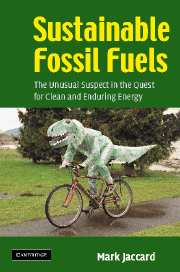Book contents
- Frontmatter
- Contents
- List of figures
- List of tables
- Preface
- Acknowledgments
- 1 What is energy sustainability?
- 2 Is our current energy path sustainable?
- 3 The prospects for clean secondary energy
- 4 The usual suspects: efficiency, nuclear and renewables
- 5 The unusual suspect: how long can fossil fuels last – and does it matter?
- 6 Can we use fossil fuels cleanly – and what might it cost?
- 7 Sustainable energy choices: comparing the options
- 8 Sustainable energy policy: how do we get there?
- 9 Broadening the definition: is sustainable energy sustainable?
- Bibliography
- Appendix ‒ synopsis and chapter reading guide
- Index
9 - Broadening the definition: is sustainable energy sustainable?
Published online by Cambridge University Press: 06 July 2010
- Frontmatter
- Contents
- List of figures
- List of tables
- Preface
- Acknowledgments
- 1 What is energy sustainability?
- 2 Is our current energy path sustainable?
- 3 The prospects for clean secondary energy
- 4 The usual suspects: efficiency, nuclear and renewables
- 5 The unusual suspect: how long can fossil fuels last – and does it matter?
- 6 Can we use fossil fuels cleanly – and what might it cost?
- 7 Sustainable energy choices: comparing the options
- 8 Sustainable energy policy: how do we get there?
- 9 Broadening the definition: is sustainable energy sustainable?
- Bibliography
- Appendix ‒ synopsis and chapter reading guide
- Index
Summary
Energy system sustainability
There is considerable evidence that our current energy system is on an unsustainable path. A significant percentage of humanity still combusts solid fuels in open, indoor fires for cooking and heating, resulting in widespread respiratory and other illnesses and several hundred thousand premature deaths each year. Fuel combustion for electricity generation, transportation, industrial production, and in commercial and residential buildings causes region-wide acid precipitation and localized air pollution with substantial harm to humans and ecosystems. Combustion of carbon-based fuels releases greenhouse gases into the atmosphere with potentially disruptive risks to the global climate. In addition to these combustion-related effects, other impacts and risks from the energy system include radiation leaks from nuclear power facilities, releases of crude oil and refined petroleum products on land and in water, health and safety concerns for energy industry workers and adjacent residents, and land and water despoliation from energy extraction activities.
If current trends continue, some of these unsustainable conditions will worsen. Although rising incomes allow more poor households to acquire commercial forms of energy that will improve indoor air quality and save lives, increasing wealth also leads to a dramatic increase in energy use and especially greater combustion of fossil fuels. This leads to growth in local air pollutants, regional acid precipitation and atmospheric concentrations of greenhouse gases.
To shift our energy system toward a sustainable path, we need a clean and enduring combination of greater efficiency, nuclear, renewables and zero-emission uses of fossil fuels, in concert with a shift in secondary energy toward greater use of electricity, hydrogen and some cleaner burning hydrocarbons, many of these produced from biomass feedstocks.
- Type
- Chapter
- Information
- Sustainable Fossil FuelsThe Unusual Suspect in the Quest for Clean and Enduring Energy, pp. 315 - 327Publisher: Cambridge University PressPrint publication year: 2006



